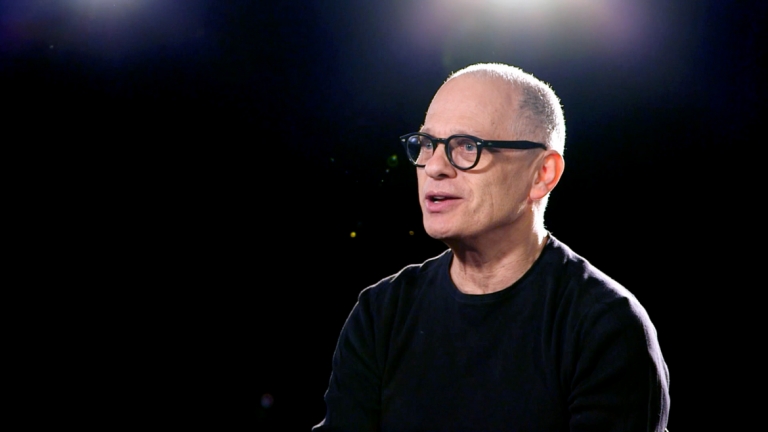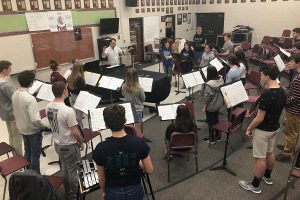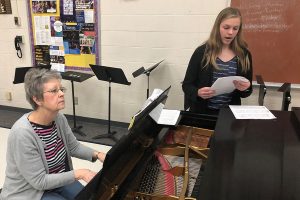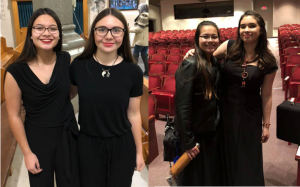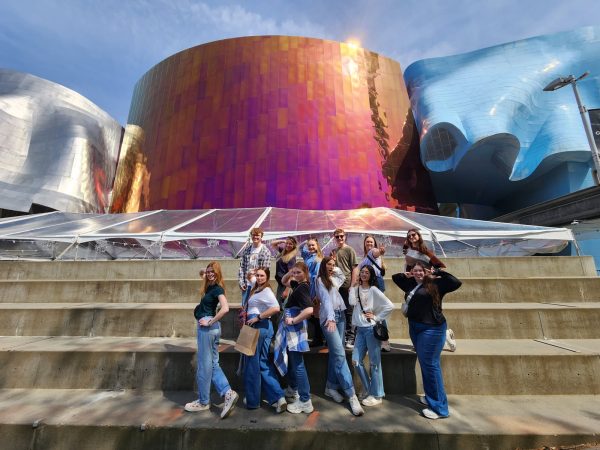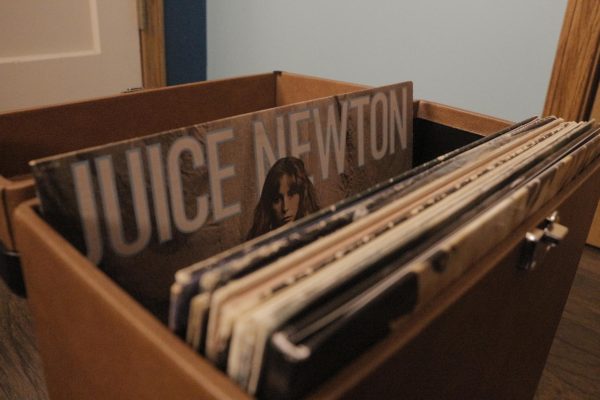Chamber Singers hold Q&A with Little Match Girl Passion composer
David Lang is a Pulitzer Prize winning composer who worked with Chamber Singers over Skype on March 26.
The Pulitzer Prize winning-composer, David Lang, took the time during seminar on Tuesday to Skype with the Chamber Singers before their performance of “The Little Match Girl Passion” at 2 p.m. on Saturday, March 30 at St. Joseph’s Church.
Lang said that the Passion was originally written for very skilled professionals at the highest level, and that he was very impressed that the Chamber Singers would be the first high school group to ever perform it.
The following questions were prepared by the various Chamber Singers and vocal director Alex Underwood.
What was one of the obstacles you encountered while writing this work?
David Lang: “Early on, I wrote something really beautiful with a very nice melody. It was one of the most beautiful things I had ever written, but I couldn’t figure out how to get past it. The problem was that what I had written was so nice that it called attention to itself and took away from the overall shape. The only way I could finish the piece was to take that beautiful thing out, and that was really weird for me.”
What is one of your favorite movements from the piece?
DL: “I kind of like them all, but when I got to the “God Have Mercy” movement, that is when I figured that this piece would actually work.”
What were the most time consuming parts of writing the Passion?
DL: “For me, a lot of my pieces are about ideas, so the time that it takes to write them is very short, but the time that it takes to think about them is really long. For me, the longest thing that took place was trying to figure out what the topic of the piece would be.”
What inspired you to relate the story of The Little Match Girl to the Passion of Christ?
DL: “I had this idea that I wanted to try to make a piece of music that took as much thought as the St. Matthew Passion by Bach. I did this in part because I’m a big Bach-lover, and I’ve written for and sung in a lot of choirs. As you all know from your choral experience in Western music, a lot of the music is Christian. When you sing Bach, you’re singing about Bach’s attitude toward his own religious beliefs. I am not a Christian, so it was always weird for me to be growing up and singing the Messiah and all these amazing pieces because there was a limit to how close I could get to that world.”
“I had this idea that maybe it would be possible to take the core of what the Gospel is, which is looking at the suffering of Jesus, and asking yourself if noticing that suffering makes you a better person. I wondered if I could take Jesus out of that equation and apply that suffering to somebody else. That idea was the easy part. The hard part was finding a story that worked. Eventually, after I spent months trying to find a substitute story, I got really frustrated. That’s when my wife said ‘How about The Little Match Girl?’ After that, writing the music became much easier.”
Why does Movement 11, “From The Sixth Hour,” use the foreign word “Eli” instead of being sung in English like the rest of the Passion?
DL: “Everyone has learned the story of Jesus in English that was translated from Greek. I am Jewish, so my religious language is Hebrew. “Eli” is one of the Hebrew names for God. This is the only word in Hebrew that’s left in the Gospel.”
A quote from Psalm 22:2, KJV in the Bible when Jesus is hanging on the cross – “And at the ninth hour, Jesus shouted in a loud voice, “Eli Eli lama sabachthani?” which is translated, “My God, my God, why hast Thou forsaken me?”
The narration before Movement 11 – “From the sixth hour, there was darkness over all the land until the ninth hour. And at the ninth hour, she cried out: “Eli”
Once this piece was so well-received, what was it like to have your creation become such a big deal?
DL: “I didn’t expect it to be so successful. I was mostly just curious about what would happen. I wondered if I took Jesus out of the story and put someone else in, is that blasphemy, or is that elevating the little match girl to a really brilliant story? When I won the Pulitzer Prize, there was one of those little bands that ran across the bottom of the screen on Fox News that read ‘Composer wins Pulitzer for taking Jesus out of the Gospel,’ and I thought I deserved that.”
“As a composer, you do what you are curious about. You do what makes your mind work and what’s emotionally pleasing to the ear. How other people react to that is totally up to them, and that’s why I’m so grateful that people liked it and that it’s beautiful to people.”
What inspired you to write such complicated rhythms?
DL: “You will notice that no one gets long, beautiful melodies to sing. No one gets melismas, or nonsense syllables, or any of those moments that choirs really love. There are no beautiful moments when you’re tuning up with your neighbor and you feel great to be alive, and there’s a reason why. When I work with text, I really want to make sure that I tell the text as clearly, as simply, and as responsibly as possible. When I work with text, I’m usually not a composer. I try to use the music to make us better readers of the text so that we understand the meaning.”
“One of the parts that’s really interesting about the little match girl’s story is that she gets closer to her grandmother as she goes along. She’s going through all this tension and misery and pain in this world. Going through this process is what brings her to this ideal world where her grandmother is, which I think of as an act of purification. In order to show this in music, we must first present something that is complicated and impure to begin the process of finding something simpler and more unified. I was hoping to deal with that conflict in the rhythm to illustrate how the little girl becomes purified through the course of the piece.”
What do you feel should be the focus of our performance? If you were in the audience and had never heard this piece before, what could we do that would make an impact on you?
DL: “I think the big problem that people have with this piece is that they think it’s really emotional, and so they think they should show that emotion. I have a completely different opinion. I think that if we could look carefully and cleanly without emotion at everything around us, we would be ashamed of ourselves for the world that we have built. I live in New York City. There are homeless people who live on my street. I have to walk by them. I have to ignore them every day. I ride on the subway where homeless people sleep because they have no place else to go. And everyone in New York is so used to tuning people out. This piece offers up the question, ‘What would we do if we lived in a world where we could not tune these people out?’ I think the temptation of this piece is to show your listener when it gets miserable. I actually think that a more emotional, powerful, and meaningful experience is to say ‘Here are the facts of the world that we’ve built for ourselves. Have you not noticed this before? Let’s just pay attention to it.’”
“I think you get the chance to decide where the emotional part of the story comes from. Are you, as the performer, doing the emotional work of guiding your audience through the piece? Or is the emotional effect supposed to happen inside the listener? Sometimes that changes with what it is that you’re singing. With this piece, the tone needs to be ‘I’m going to give you the facts, and if you really listen to these facts, you won’t be able to look at yourself in the mirror tomorrow.’”
What advice would you give to a young composer?
DL: “I really don’t think writing music can be taught. When I’m teaching my very high-level students, I just ask them ‘What did you want to do when you started writing the piece? What did you think when you heard it? Are you being honest with yourself about whether or not you liked the result?’ I think that’s the secret to writing music.”
“Sometimes you go through all the work of writing something down, and then you talk yourself into liking it because you did it. The really important thing is to pick out all the parts that you liked and loved, and then only keep the parts that you loved. I also think the problem with writing music is that so many people have been writing music for forever. There’s so much music all over the place. The real truth is that no one who has written music in the past or in the future knows exactly who you are and what makes you happy, what makes you thoughtful, what makes you cry, or what makes you feel like life is worth living. No one knows that better than you, so I don’t understand why everyone in the world isn’t writing their own music.”
21cleiker@usd489.com
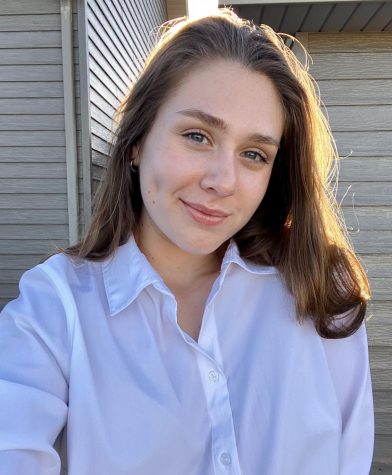
Caitlin Leiker is a senior, and this is her third year in newspaper. She is involved in Chamber Singers, Musical, Spring Play, National Honor Society,...


